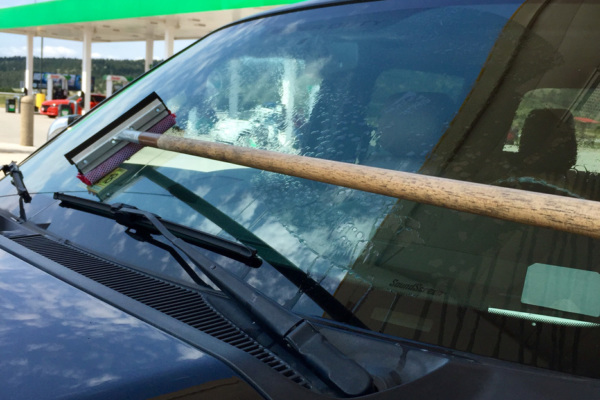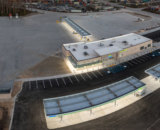With RV traffic up as vacationers take to the roads to enjoy time together while avoiding crowds, we’ve been talking a lot about this truckstop and travel center customer lately. (See 14 Things RVers and Recreation Travelers Need on the Road, RVers are Hitting the Road and Truckstops Have What They Need and Eight Ideas to Help Draw Summer Traffic Into Your Truckstop or Travel Center.)
Whether we’re talking about those who are trying the form of travel for the first time, those who regularly take out their motorhomes and travel trailers on the weekends, or the surprising number who use them to live on the road seasonally or full-time, these customers seek many of the same amenities you’re already offering to professional over-the-road drivers. If RVers aren’t on your radar, they should be.
I sat down with a friend who has spent the better part of four years and accumulated more than 100,000 miles traveling the country in a diesel-powered pickup towing a 30-foot travel trailer to learn more about his life on the road. He shared his experiences and made some recommendations for how truckstops and travel plazas could better serve RVers.
Auto Diesel Signs: The green “Auto Diesel” signs that some locations display on the canopy posts are extremely helpful and allow drivers of oversized vehicles to plan their path to the pump. Without signage they have to maneuver through a sometimes crowded fuel island trying to look for green handles and hope they don’t get stuck in a space too tight to navigate.
Diesel Pump Placement: When a location’s diesel pumps are one or two gas/diesel combination pumps on the car island, this can pose a challenge for RVers. It’s not uncommon for the combo pumps to be occupied by gasoline buyers when there are plenty of empty gas-only pumps. In that case an RV driver in need of diesel has to wait, and not uncommonly, can’t easily do so without blocking traffic. Likewise, a single stand-alone diesel pump sandwiched between two or three gasoline pumps is also a challenge for drivers who are towing unless the entire row of pumps is open.
Instructions on Truck-Only Islands: Often, pumps on the truck islands lack instructions for non-professional drivers. The pump often has a card slot, but an RV driver has to swipe his or her bank card often to find out it’s for fleet cards only. Likewise, pumps with DEF often have no instructions. Do you pump diesel first then DEF? Are they separate transactions? Instructions for non-professional drivers would be very helpful.
Long-Handle Squeegee: If the pump dispenses diesel, the window squeegee at that pump should be long-handled to accommodate the larger vehicles that will invariably use that island.
Delivery Pick-Up: People who RV full time or for months at a time are in constant search of places that will accept and hold deliveries for them. It’s not only for online shopping, but those who call their RV “home” and have no other residence often have mail services that will forward batches of mail to them. Travel plazas who offer such services for OTR drivers might consider offering the same (and promoting it) to RVers as well.
RV Services: A surprising number of full-time RV people of all ages (typically those more active and outdoors oriented) rarely or never stay at traditional “resort” campgrounds. In the Western U.S. especially, they will stay on BLM land or other “off the grid” places for days or weeks at a time. Part of it is to save the cost of a campsite, which if you’re paying for 365 nights a year adds up, but not always. Sometimes they like to get away or stay in some beautiful location in the middle of a desert or in some national forest or state park campground with no amenities. It’s one of the main draws of RVing versus staying at hotels.
While not traditional, full-hookup “KOA” campers, these folks still need all the same things—bulk propane, fresh water, a dump station, laundry, etc.—that you’d find at a campground. Finding these supplies and services isn’t always easy and can require several stops. If a retailer offers fresh potable water, a dump station, bulk propane, laundy or similar types of services, advertise it on the highway.
Basic RV Supplies: Fuel retailers on the interstate should consider selling some minimal RV supplies, such as holding-tank treatment, RV/septic-safe toilet paper, travel-size food and condiments, etc. It’s a missed opportunity to serve these customers.
Potable Water: RVers need to refil their tanks, so if you offer potable water, label it, promote it, and make it easy to get to with a 50-70 foot pickup+trailer or motorhome+towed car rig. “Often I’ll see water spigots on the fuel island or by the air pumps, but I don’t know if they’re potable water and I don’t know if I’m allowed to use it to top off my water tank or fill a portable seven-gallon jug,” my friend said.
A Place To Park While They Shop: This applies more to small-footprint locations, but if RVers fuel and want to go inside the C-store, they can’t if there’s nowhere for them to pull to the side. A 50-foot rig ties up a whole row of gas pumps. When RVers are done fueling, they want to free up those pumps before they head inside the store or restaurant, but if there’s nowhere for them to pull aside, they may just have to pump and leave.
Signage with instructions would be great. What should an RV customer do if he or she wants to come inside? Is it okay to block pumps while RV customers shop or eat? Is there a pull-off space behind the store? “When you’re towing, you can’t just go exploring a parking lot not knowing if you can get back out,” my friend told me, adding that he got trapped in a gas station parking lot in New York.
He was blocking the pumps and couldn’t maneuver out of the space and people were understandably mad. He had to unhitch, then re-hitch at a different angle. “It took an hour to squeeze out of there. So now if I’m not sure if I can fit, I don’t try,” he said.
Electricity: Full-time RVers who avoid campgrounds in favor of state parks or national lands without amenities often have solar panels to charge their batteries. The onboard batteries are deep cycle and can power the fridge, an inverter for TVs and computers, the propane heater, the water pump for taking a shower, etc. Sometimes they run low due to excessive cloudy or rainy days, for example, and need to charge with shore power (anywhere from a 110-volt standard outlet to a 220 RV outlet with 30 or 50 amp service).
My friend said the he only saw a travel plaza parking lot with RV electrical hookups once. It was pay by the hour. He often wished more places had those.
“Maybe they’re not money makers. I’m just speaking from a ‘needs’ standpoint,” he said. “If an RVer could pay $10 or $15 and stay at a travel plaza where they could charge batteries, get some intensive computer work done, and enjoy a few hours or overnight of shore power versus having to go spend $30-$80 or more to unhook and setup at a campground to get the same thing, most would prefer the former. Sometimes you just want to be in-and-out, and campgrounds aren’t often a quick in-out proposition.”
Laundry: Laundry is a big deal and a huge pain for RVers. The ideal scenario when living on the road or on a long cross-country family trip is to find a campground with a huge, nice laundry room, my friend said. “Good luck,” he added. “There are some, but often there are a few lousy machines that 100 other campers are fighting for. You could go into town and do laundry, but not with your rig.”
If only there were a place on the interstate with a big parking lot where you could park, do multiple loads while you work or relax or restock with supplies. Luckily, there is—travel plazas. From the truckstop point of view, there are fewer long-haul truckers, and more and more drivers go home at night. Truckstop laundry rooms aren’t as easy as a theater room or game room to convert into other uses to match the changing needs of professional drivers. Since you can’t turn your laundry room into something else, you need to find new customers who need to do laundry on the road. Luckily there is a huge potential customer base out there who have no idea that you have washers and dryers. Get the word out.
RVers, like truckers, need fuel, food and parking near major highways. Locations offering dump stations, fresh water, laundry and propane have unknowingly already done the hard work to attract RVers, so be sure to capitalize on it.
Subscribe to Updates
NATSO provides a breadth of information created to strengthen travel plazas’ ability to meet the needs of the travelling public in an age of disruption. This includes knowledge filled blog posts, articles and publications. If you would like to receive a digest of blog post and articles directly in your inbox, please provide your name, email and the frequency of the updates you want to receive the email digest.



